Apple is handling AI so much better than Microsoft I may ditch Windows for macOS Sequoia
C'mon Microsoft, do better
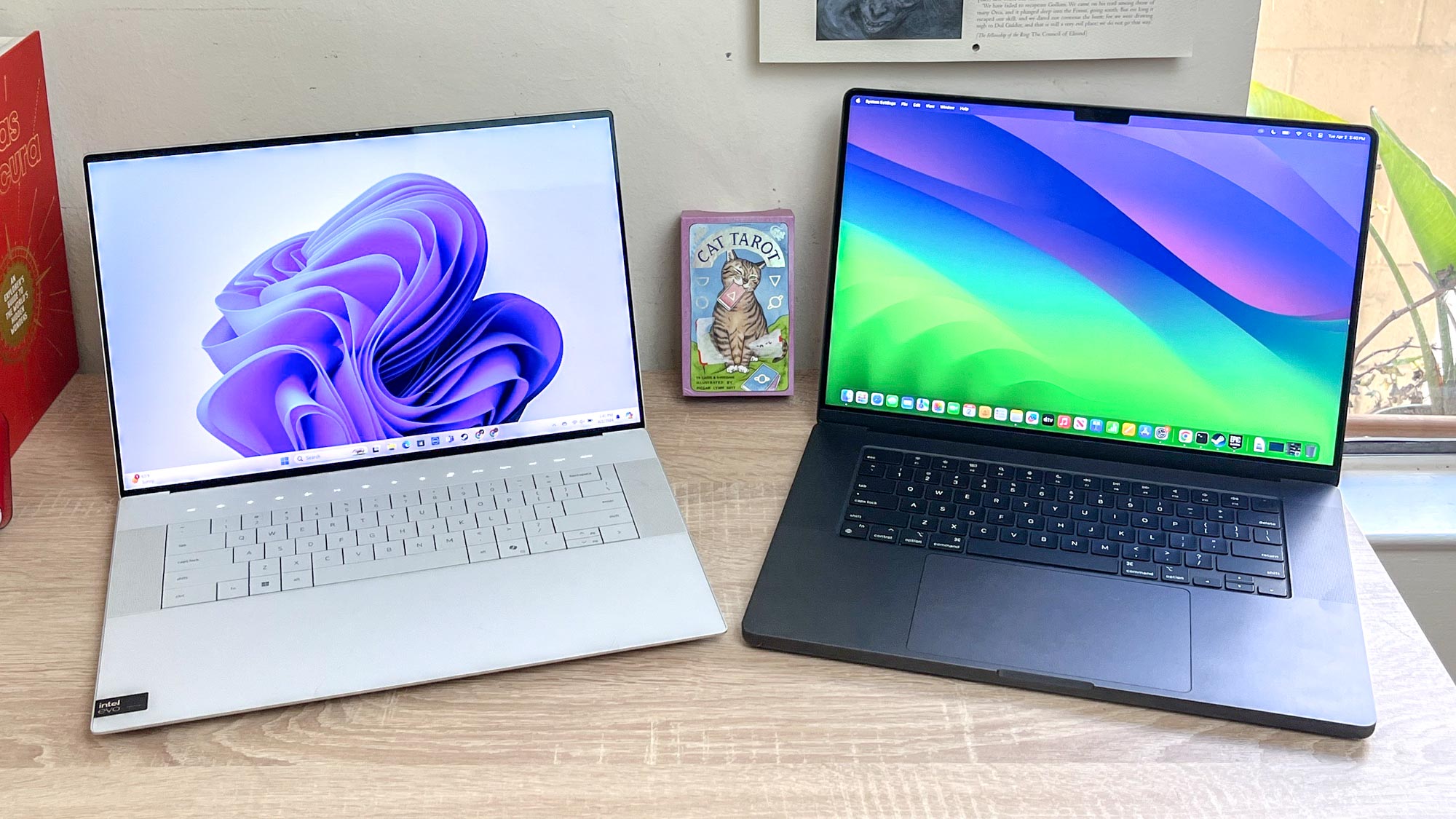
I've been a lifelong Windows user, but Microsoft's mad dash to throw AI into everything is starting to make me feel like I should bite the bullet and switch to Macs.
I grew up using Windows PCs almost exclusively, so I've never quite felt at home in macOS. And while Windows 11 has its foibles, on balance I think Microsoft's done a decent job of maintaining and improving it since it debuted in 2021.
But after attending WWDC 2024 and hearing Apple talk about AI and privacy the way I wish Microsoft would, I'm sorely tempted to go all in on macOS Sequoia when it debuts later this year.
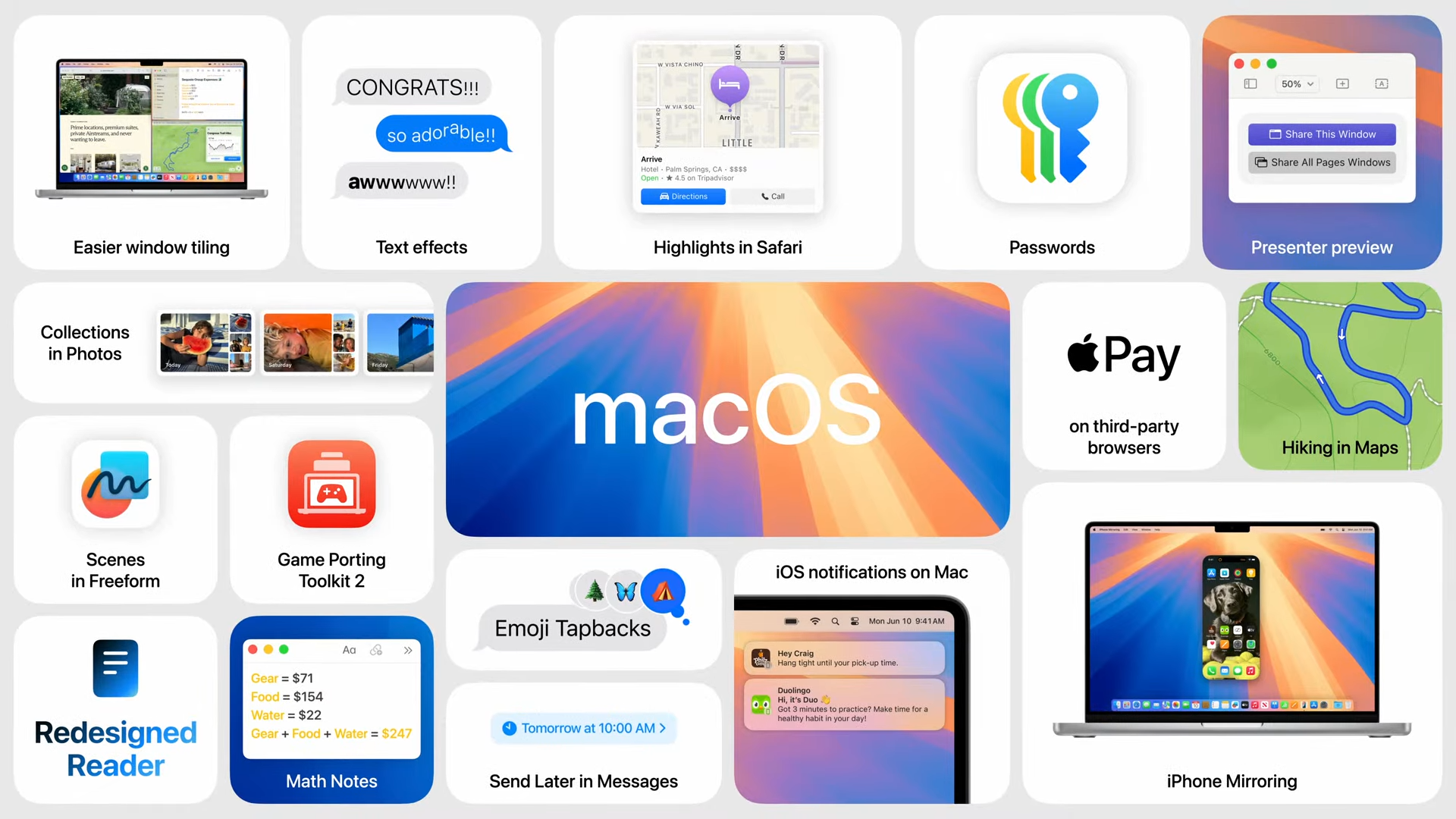
Admittedly, this has a lot more to do with Microsoft's relentless efforts to push "AI" into everything it sells than it does with how much I like Apple products. I carry an iPhone because I used to write about games and Apple's App Store was the place to be if you were a mobile game dev, but otherwise I generally don't get on with Apple's design philosophies. Too often I feel like I can't customize or control a key aspect of my device because Apple didn't give me the option, and I hate that feeling.
But I'm starting to hate Windows Copilot and all the ways in which it's infiltrating my PC even more. I've been using various forms of "AI" since Microsoft rolled out Bing with ChatGPT back in 2023, and I've yet to find a compelling reason to use any of them except to fill the Internet with garbage data.
While Microsoft constantly harps on how integrating Copilot will make you more productive, all I've seen it do is either Bing things for me or haphazardly summarize or rewrite text. Oh, and it can generate images which are fun to drop in chat for a laugh but not actually very useful for anything, since they clearly look like they were generated by AI.
Admittedly, it's early days for this technology and both companies still have lots of time to hang themselves as they integrate AI into their operating systems. But as Apple gets off to a late start in this particular leg of the AI race, I can't help but feel attracted to its privacy-first marketing for Apple Intelligence.
If my PC is going to work for me, I have to trust it
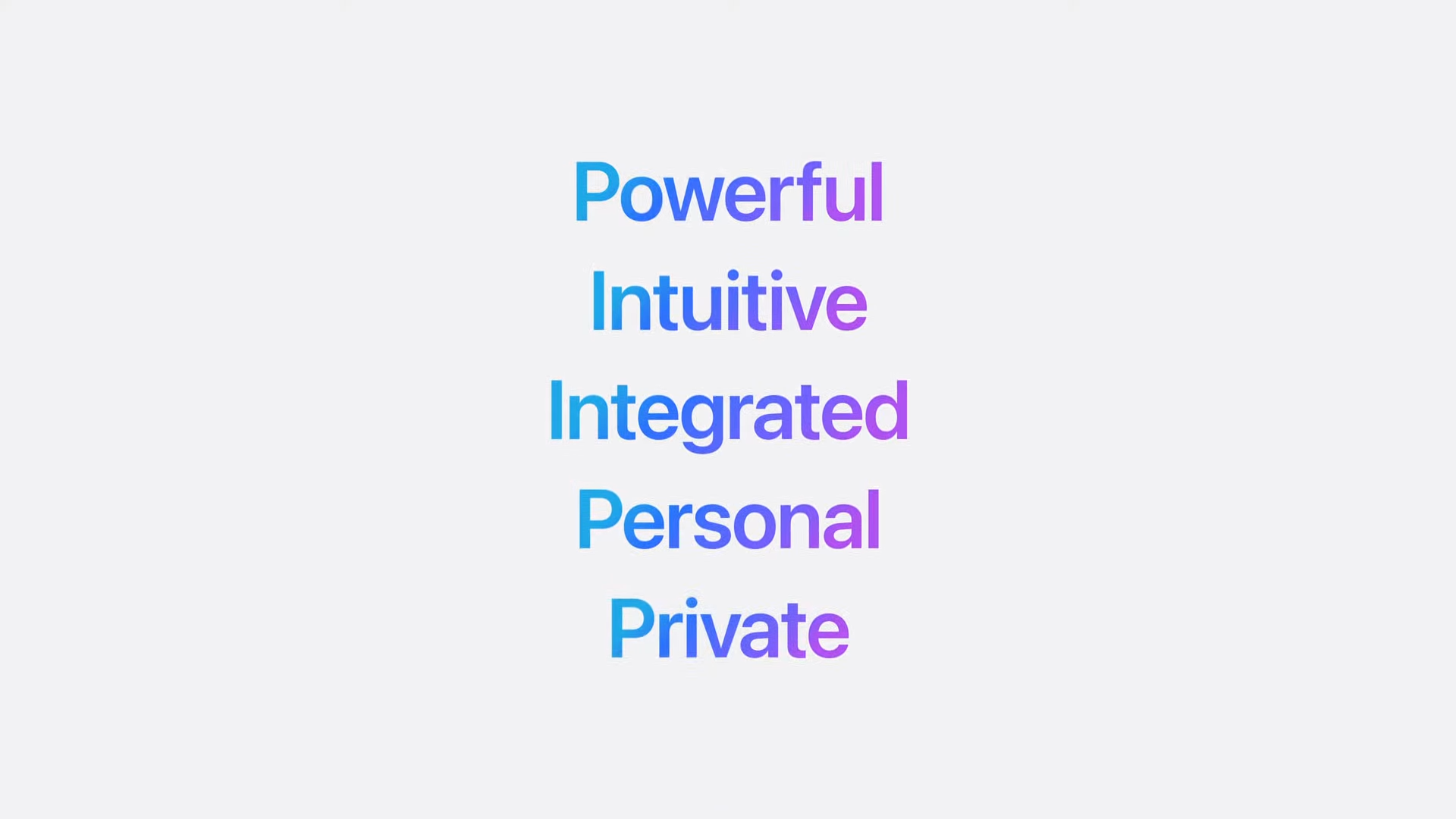
In fact, Apple is making privacy such a key pillar of its marketing for 2024 that it put out a press release highlighting all the ways in which its new operating systems respect user privacy. Sure, it's a press release meant to make Apple look good, but it's the kind of announcement that Microsoft hasn't made—and likely couldn't without seriously reworking its data infrastructure.
For example, when Siri gets its big makeover with iOS 18 it will be integrated with ChatGPT-4o and supposedly be able to tackle much more complex requests than it can now, like being able to see inside apps on your device and take actions within them to fulfill your requests. At WWDC, for instance, we saw Apple demonstrate how you can ask the new Siri to find photos of a specific person and location, then ask Apple's AI assistant to edit them so they really pop.
Apple says the new Siri will always try to do all the processing work required to fulfill your requests on-device, so you know that your requests and images are not being sent anywhere or seen by anyone. But if Siri decides it needs more processing power to fulfill your request, it can dial out to Apple's servers for additional horsepower.
Those servers are Apple's Privacy Cloud Compute servers, which run on Apple silicon and thus have the same security features as your iPhone or MacBook, like Secure Enclave and Secure Boot. Apple promises your data is never visible to anyone (including Apple employees) on these servers and that the data is deleted immediately after your request has been fulfilled. Apple has also promised to allow "independent experts" to inspect the code running these Privacy Could Compute servers and verify its claims are true.
But if it decides it needs to use ChatGPT-4o Siri will ask for your permission to send your request and/or images/documents to ChatGPT before it does so. That's such a small step in the process, yet it adds so much peace of mind for me because it reminds me that I'm sending my personal data to a third-party server for processing.
Contrast that against Microsoft's stance on AI, which seems to be that you ought to just have it seamlessly integrated with everything you do on your PC. Even if I was comfortable with that, I'm not at all comfortable with how little Microsoft seems to value user privacy. While the company has published a guide to how Copilot uses your data, it clearly outlines that you have to pay to keep your data secure.
While the basic version of Copilot that's freely available to Windows users does have a setting which lets you enable or disable its ability to read data from Microsoft Edge, that's all the control you have over your privacy. To truly ensure the requests and data you send to Copilot are private and not shared with anyone, you have to pay $30/month for a Copilot for Microsoft 365 subscription.
So if you're a paying Microsoft customer, you'll see a "your personal and company data are protected in this chat" warning when using Copilot. If you don't see that warning, your data is not protected.
And frankly, I just don't trust Microsoft not to shop my data around to advertising companies or other data-driven ventures. The company is clearly very comfortable selling user data to advertisers, as you can see if you happen to be in the EU or UK and use the Outlook app.
That's because in select regions Microsoft has added options for users to opt out of having their data sold to third parties, presumably due to regulatory pressure. I recently asked my UK-based colleague to show me what options he has to disable sharing Outlook data with advertisers, and he sent over a massive list that looks to include at least 100 or more entries.
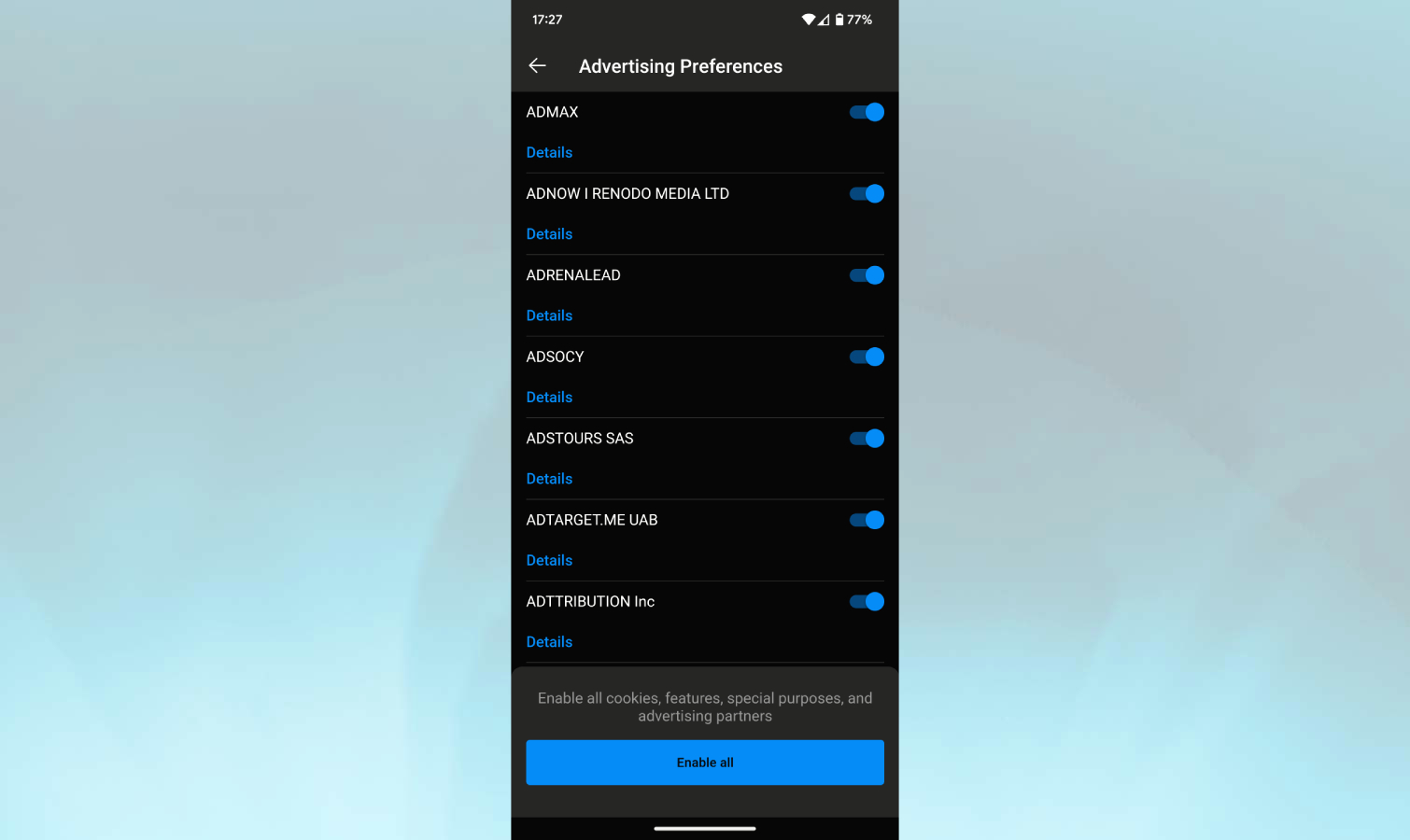
It's quite a list, and it includes such promising advertising partners as A Million Ads and Bytedance, two companies I'm not particularly interested in sharing data with. Of course, since I live in the U.S. I have no easy option to disable sharing data with them if I were to use Outlook.
And that's really why I'm starting to seriously dislike Microsoft's AI efforts—it feels like the company wants me to let Copilot do my work for me, but I can't do that if I don't trust it. I already don't trust that modern AI chatbots can do a decent job of writing text or generating images, and now I'm watching Microsoft lock up its best AI tools with the most respect for users behind paywalls. How can I trust this company not to sell my data to advertisers for a quick buck if true data privacy costs $30/month?
Apple, on the other hand, seems to be making a strong argument for integrating AI into everyday life by effectively promising it won't try to make money on Apple Intelligence. Instead, it seems like Apple's AI efforts are helping to make Siri the virtual assistant it was always promised to be, as well as improving features like Spotlight Search and dictation in Notes.
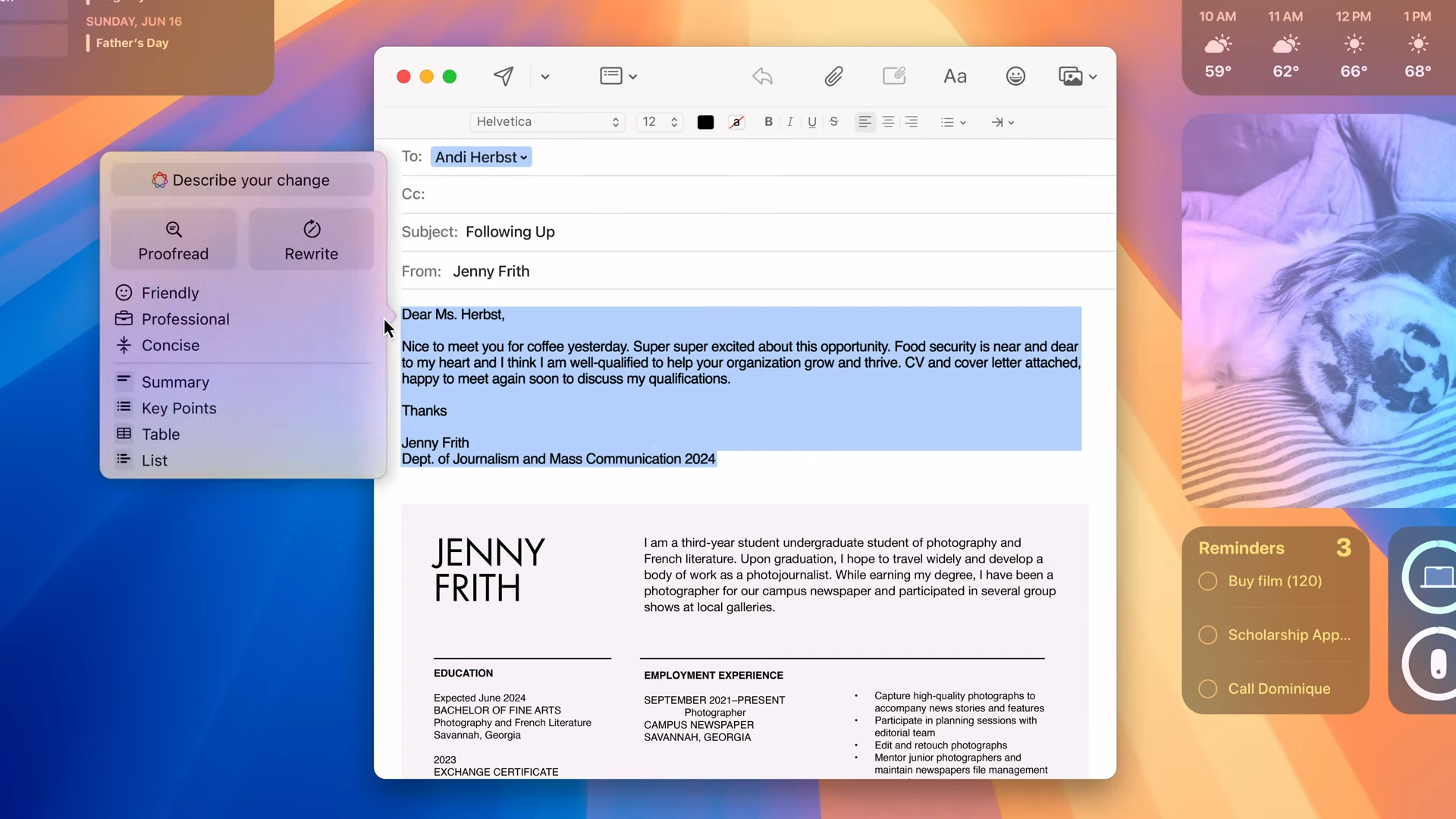
So while I'm still as uncomfortable as ever about letting the robots write my emails for me, I like that in macOS Sequoia I can at least ignore that feature and it doesn't constantly prompt me to use text generation, unlike in Google Chrome and Gmail.
Outlook
In general, it feels as though Apple's privacy-minded approach to integrating AI into its products is the best I've seen so far from a major tech company.
While Apple may be reacting to competitors and seen as trailing the pack when it comes to AI, that's actually very reassuring to me as a customer. It's been, frankly, a little terrifying to see how unabashedly Microsoft has thrust AI into all of its products in record time, and I think that rush to market is going to do more harm than good in the long run.
Heck, I didn't even get around to mentioning the embarrassing privacy kerfuffle Microsoft endured last month around the debut of Recall, a new feature coming exclusively to Copilot+ PCs which will let you opt in to having your PC photograph everything you do on it.
The pitch is that Recall helps you look up something you were doing on your PC last week, but the problem is Microsoft unveiled it without adequate safeguards. Now, the company has had to rapidly backpedal and release multiple updates about how Recall is being reworked to better protect your privacy, to the point that this Copilot+ headline feature has been delayed and now won't launch with Copilot+ PCs on June 18.
So while I've loved Windows since I was a kid, Microsoft is making it harder and harder to not jump ship. I'd dearly love to see Windows 12 (or whatever comes next) do a better job of protecting user privacy and giving you control over how your data is used by companies, but until I do I'll be practicing my macOS keyboard shortcuts and trying to get comfy with Sequoia.
More from Tom's Guide
Sign up to get the BEST of Tom's Guide direct to your inbox.
Get instant access to breaking news, the hottest reviews, great deals and helpful tips.

Alex Wawro is a lifelong tech and games enthusiast with more than a decade of experience covering both for outlets like Game Developer, Black Hat, and PC World magazine. A lifelong PC builder, he currently serves as a senior editor at Tom's Guide covering all things computing, from laptops and desktops to keyboards and mice.
-
GW43 One thing that I have always found intriguing with Apples claim to privacy and data is their dependance on China for their manufacturing process.Reply
I remember a conversation with a former employer, and he used to work for Bell labs when they were still around saying that their team grabbed 10 of the original iPads when they first came out to test in their facility and something like 7 or 8 of them pinged to servers in Hong Kong.
His point that he always made with Apple products is that when you are operating at the scale that they do, shipping millions of products a year and your manufacturing is nearly exclusively dependent on a government where civilian surveillance is a part of the day to day, there is no way that you could actually monitor if something nefarious was going on.
A worse point is that Apple is so dependent on china for their chips and manufacturing that it gives way too much leverage to a government organization that wants to spy on civilians.
Im saying all this as an apple product user btw haha so it makes me hypocritical. But regardless it was a conversation that stuck with me and has always made me curious of that dynamic to Apples "promise" of security and privacy. And paired with the fact that no government employees with any sort of clearance factor as a part of their job can use or have apple products on site. We always had to use something other than apple for our work together.
It has always surprised me that these things are taken at pure face value by the public and tech journalists that a 3 trillion dollar company is essentially saying "just trust us" and they take it as gospel. -
amirand926 This also enters into the idea of whether you consider FOSS a good thing or a bad thing. If you're going to leave Windows, just make a dual boot and pick a fav Linux distro. Tons of more open choices for roads to take when it comes to AI or whatever.Reply
Apple is closed, closed and more closed and most like it because it is "pretty" or "simple," or whatever.
There is no transparency and you must go through them to breathe, as if I dont like Red Delicious apples more than green ones. Pssh! Haha :P
You can do anything on Linux you can on Apple and it's FOSS. Without delving into anything TLDR, it doesnt hurt to try it first. Put any distro you want onto a USB drive, boot from it and try. Anything AI on Mac will be equally as great or better. I suggest starting with Ubuntu if you are new to it. It's origin is from England unlike some others which are from China and again, reread what GW43 wrote.
Anyway, that's my $0.02 donation. Use it to buy Linux and not $123456789.00 you'll need just for the Apple PSU.
